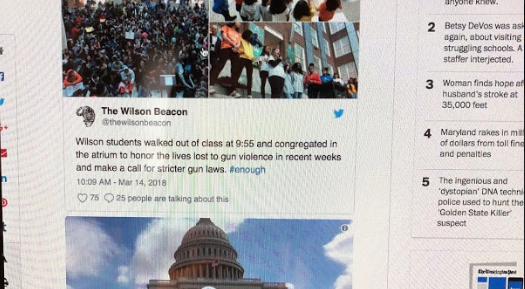The tragic Marjory Stoneman Douglas High School shooting back in February sparked a series of monumental student protests that many RHS students and other young people around the country had never witnessed before. Debatably the most impactful protest in recent American history, the walkout, which was organized at RHS by the Students Demand Action club, was both a memorial for the 17 lives lost in Parkland as well as a form of peaceful dissent against the country’s gun laws and regulations. In essence, it was democracy in action, representing a new generation of young people that used their power and human rights to fiercely speak up and change the world they live in for the better.
However, in the wake of the walkout, many students are questioning its impact and if it really did influence lawmakers’ decisions on gun regulations or school safety issues. Many who walked out understood that their sign of protest would not produce immediate action- Congress wasn’t going to suddenly unite and ban all assault weapons or take any other drastic step towards regulating America’s guns. However, the protest did create a certain momentum that past school shootings were not able to induce. Unlike other movements, its impact was nationwide, with both local and urban schools participating. Its purpose wasn’t necessarily to produce instant results, but rather to sustain the public outrage and keep the movement alive.
The marching of hundreds of thousands of students across the nation is something lawmakers were unable to ignore. By making signs, delivering powerful speeches, and standing in unity against gun violence, the students were able to demonstrate that they are not apolitical, weak, or mum, and that they have democratic power that they are not afraid to use. The fact that many of the participants are either just below the legal voting age or already eligible to vote also plays into the walkout’s effect. Not only did it inspire many adult voters, but many vocal student marchers have stated that they will make gun laws a decisive factor in their voting choices, which can put pressure on local representatives as well as Congressmen to take a clearer stance on gun issues, especially with the 2018 Midterm elections in Congress rapidly approaching.
The shooting and the walkout have prompted other gradual but significant changes. Some Republicans have since called for more background checks and raising the legal age to buy an assault rifle, a discussion that was unimaginable a few months ago. In the wake of the Stoneman Douglas shooting, President Trump called for more mental health restrictions and stricter background checks, policies that many protesters support. He also signed into law on March 23rd the Fix NICS Act of 2017, which was proposed after the Sutherland Springs shooting and gained bipartisan popularity after the Florida tragedy. The regulation makes it harder for criminals to purchase guns by punishing government agencies who fail to report criminal records to the National Instant Criminal Background Check System, which determines the eligibility of someone trying to purchase a firearm. Other regulations that have been proposed include banning bump stocks and raising the age to buy an AR-15 from 18 to 21. Although it is not clear whether these will garner enough support in Congress, student protestors have unquestionably forced lawmakers to give them more consideration than in the past.
Student activists have demonstrated that their movement will not fade away. RHS Students Demand Action Club member J.T. Cambria says that “the last thing the club wants is people thinking that the issue ends after the walkout.” The club’s active Instagram page, @rhssda, keeps the movement alive by promoting the concept of #neveragain through inspirational and update posts. Cambria supports that “whether it’s coming to meetings or just starting the conversation about gun control, if everyone does their part to keep publicizing this issue then we can all make a huge difference”.
Annie Probert
staff writer
Graphics: Amelia Chen

